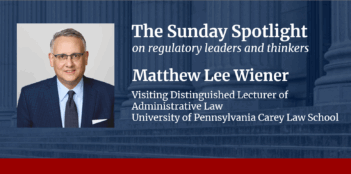
Scholars comment on a new book that advocates greater simplicity and clarity in the expression of laws and regulations.
Through legislation, regulations, and other legal materials, legislators and regulators regulatory provide corporations and individuals with guidelines about how to live their lives. In addition, regulation frequently requires corporate actors to disclose important information to consumers. Yet many of these materials—whether produced by government agencies or corporations— prove to be incomprehensible to the average consumer and even to lawyers.
In her recent book with Will Walker, Incomprehensible!, Wendy Wagner, a professor at the University of Texas School of Law, diagnoses the problem of regulatory incomprehensibility and offers a possible framework for reducing the problem. The main solution, she argues, lies in providing legal incentives for actors to speak comprehensibly. To make both disclosures and directives more comprehensible to their target audiences, Wagner argues that drafters of legal materials should be held legally responsible for failing to communicate comprehensibly.
The Regulatory Review invited thought leaders to comment on Wagner’s analysis and her suggested solution. This series of essays begins with Wagner introducing her main thesis and then it turns to four commentaries by leading thinkers from across the disciplines of law, engineering, economics, and political science. Wagner closes out the series with her response to the four commentaries.
This series brings together the following contributors: Omri Ben-Shahar, a professor at the University of Chicago Law School and director of the Coase-Sandor Institute for Law and Economics; Stephanie Hunter McMahon, a professor at the University of Cincinnati College of Law; Martin J. Murillo, of the Institute of Electrical and Electronics Engineers; Rachel Augustine Potter, an assistant professor of politics at the University of Virginia; and Wendy E. Wagner, a professor at the University of Texas School of Law.
Incomprehensibility and the Law
March 30, 2020 | Wendy E. Wagner, University of Texas School of Law
To solve the incomprehensibility problem, speakers must be held legally responsible for ensuring that their target audience can reasonably understand the key message. If speakers cannot make this showing, they bear all the consequences of the resulting communication breakdown.
Incomprehensibility is a Trust Problem
March 31, 2020 | Rachel Augustine Potter, University of Virginia
Wagner highlights a fundamental communication problem between agencies and their stakeholders. No side truly understands the other, resulting in policy outcomes that are overly complex and which ultimately devalue the entire regulatory system.
The Tax Law System is Only Incomprehensible to Some
April 01, 2020 | Stephanie Hunter McMahon, University of Cincinnati College of Law
Given what appear to be everyone’s weak incentives to provide comprehensibility, Wagner’s analysis helps show how the federal tax system has important lessons to learn. But this system is not inherently incomprehensible.
Machine Learning Could Make Government More Incomprehensible
April 02, 2020 | Martin J. Murillo, Institute of Electrical and Electronics Engineers
The future of machine learning in government is uncertain because the technology is applied where processing help is needed. The principle of governmental transparency is only fulfilled when information is relevant and understandable to a general audience.
The Elusive Pursuit of Comprehensibility
April 06, 2020 | Omri Ben-Shahar, University of Chicago Law School
In contrast to Wagner’s diagnosis, my own suspicion is that the failure of comprehensibility is due not to bad incentives of disclosers, but to a profound and insoluble problem. The problem is not the complexity of texts but the complexity of decisions and choices.
Moving Toward Comprehensibility in the Legal System
April 07, 2020 | Wendy E. Wagner, University of Texas School of Law
The essays in this series reinforce the initial motivation in writing the book—namely, to help jumpstart a cross-specialty conversation about perverse incentives for incomprehensibility in legal systems. The conversation is officially underway.



